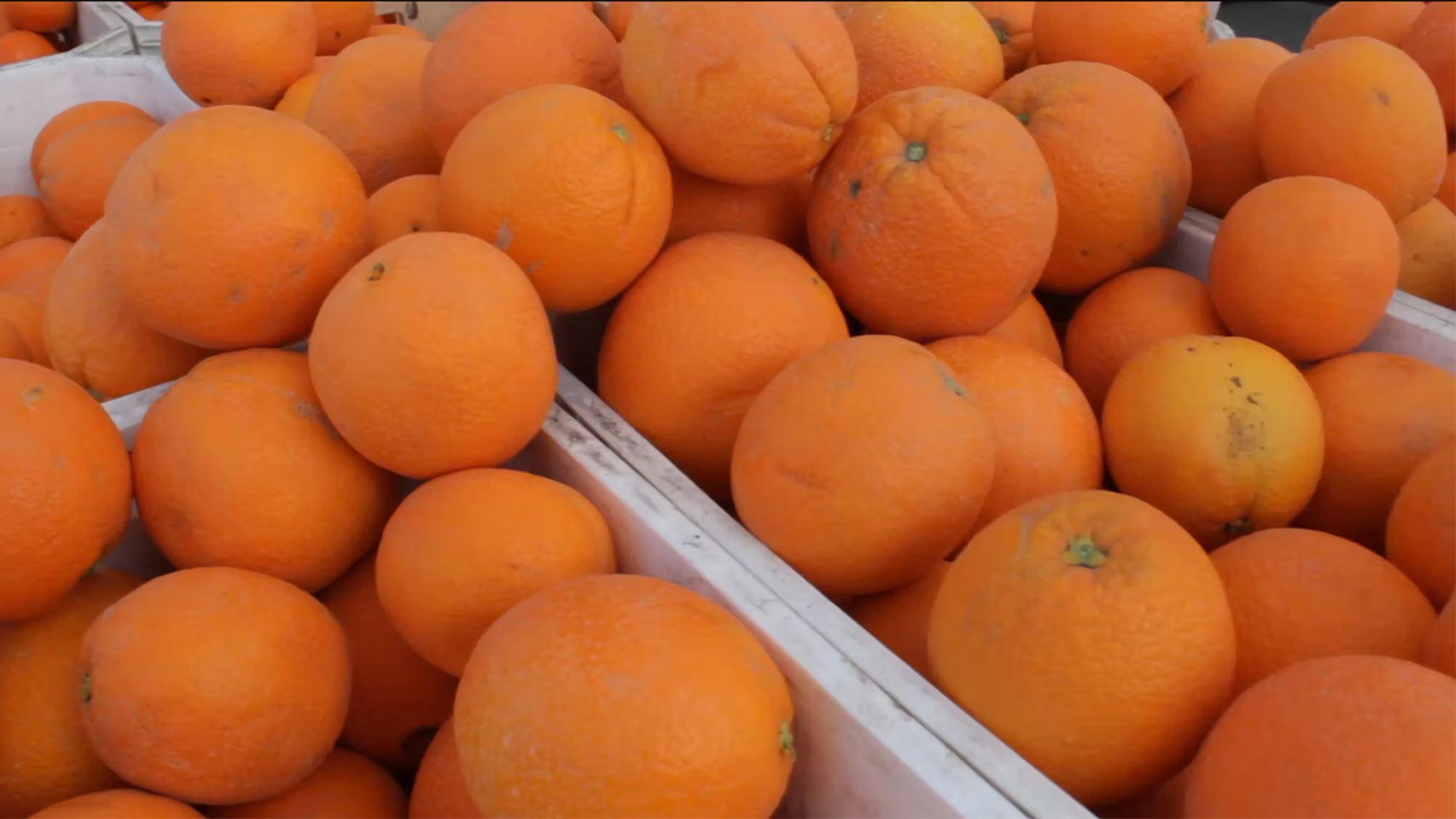UC Davis’ efforts to provide food to students in need is making a measurable impact.
When students pick up cereal, bagels, canned goods, vegetables and more from the Pantry, the Associated Students of UC Davis food distribution center located prominently inside the Memorial Union, they don’t have to prove a need or have a certain level of income. Instead, they are asked to swipe their ID cards to provide data on demographics. Students interested in the services also receive emails inviting them to participate in surveys or other research projects.
That information gives researchers like Gwen Chodur, a student researcher in the Graduate Group in Nutritional Biology, a good picture of who’s using UC Davis food security services, and the kind of difference the programs are making.
Their findings: Food assistance at UC Davis is making students healthier.
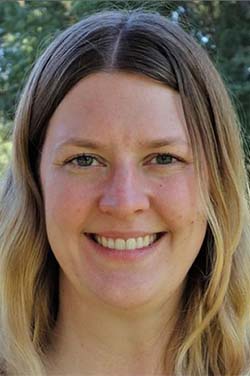
“We might know that 100 people came to Aggie Compass yesterday, and we can see of that number how many are transfer students, freshmen, undergraduates, graduate and professional students,” said Chodur, who works with the Aggie Compass Basic Needs Center, which connects students with programs centered on hunger, housing, mental health and more. “My experience with community programs is they know their clientele, but they’re usually not as data-driven as we are.”
Chodur, along with researchers from other UC campuses and the University of Arizona, last year published a paper in the Journal of Nutrition Education and Behavior that examined survey data from students around the UC system to measure their own perceived physical and mental health before and after receiving assistance from on-campus basic needs centers.
“Specifically, students who visited the food pantry more frequently reported improved depressive symptoms and improved self-perceived health after having access to the campus food pantry,” that paper said. “Furthermore, students who made more visits to the food pantry also reported better sleep sufficiency, which was related to improved depressive symptoms and improved self-perceived health.”
Suzanna Martinez, an associate professor of epidemiology and biostatistics at UC San Francisco who coordinates basic needs evaluation efforts across UC campuses, was the principal investigator of that study. She said the UC system is unique in how it works across campuses to measure the impact of food security programs.
Chodur and other researchers are also examining how often students eat fruits and vegetables before and after visiting the Pantry. Forthcoming research shows higher levels of daily fruit and vegetable consumption among students who use the Pantry more often, she said.
Another campus researcher examining the outcomes of students who use services like the Pantry is Marcela Radtke. She graduated this month with a Ph.D. in nutrition and a focus in cognitive neuroscience, and has been researching the way use of programs like the Pantry affects the level of carotenoids in the blood. Those compounds are found in colorful fruits and vegetables, and can prevent chemicals released by the body during stressful situations from doing too much damage.
“I like to think of them as the police officers of the body,” she said. “They’re making sure everything is working properly.”
After presenting her research at the UC Davis Grad Slam this April, she is working toward publishing her research, including another project examining whether food security programs improve cognitive function in students.
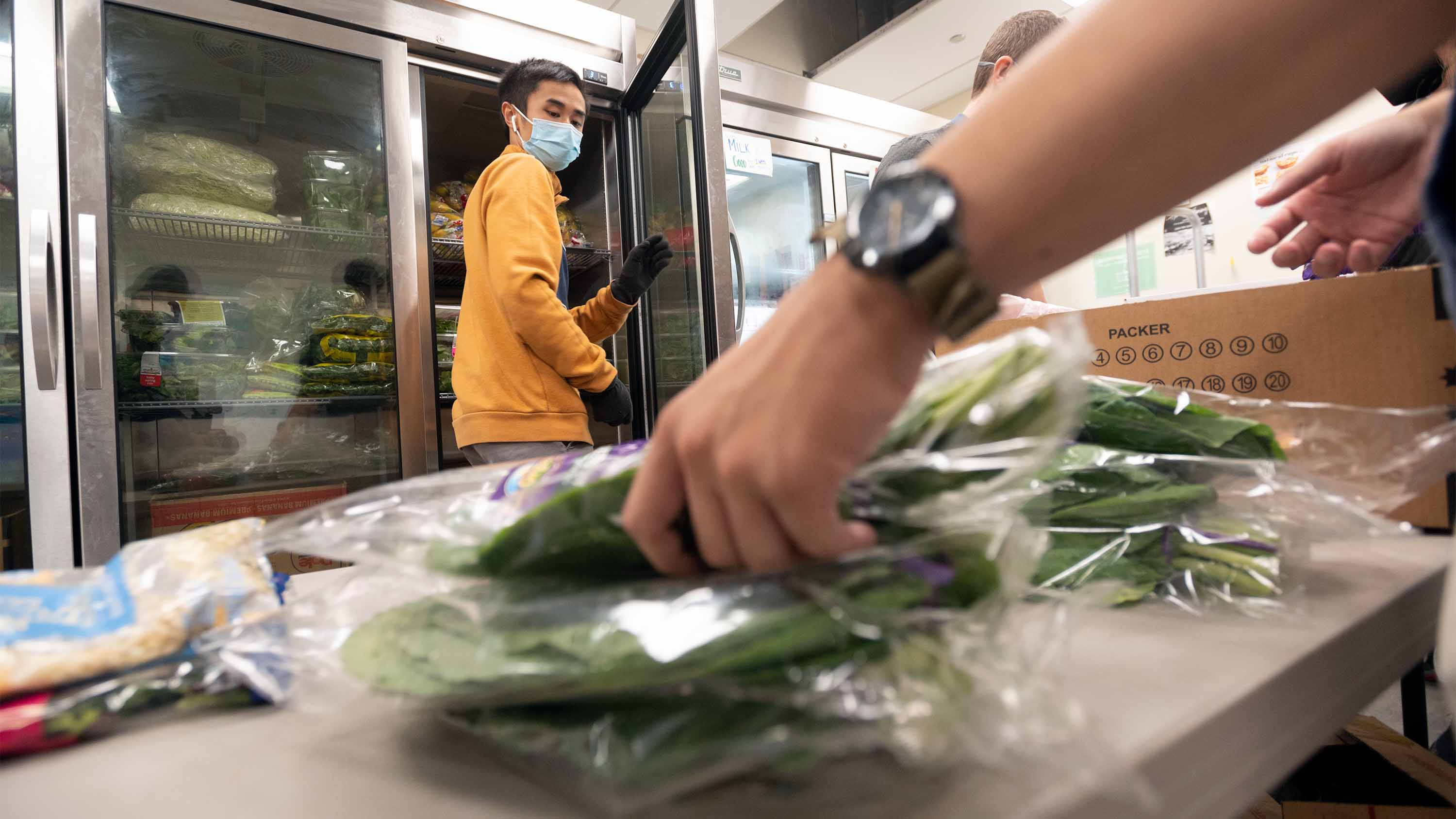
Addressing student food insecurity: Who needs help?
UC Davis researchers are also examining usage data to gain a better idea of who is getting help from the Pantry.
In a paper published this March, Chodur and others from UC Davis do a deep dive into the demographics of people visiting campus food resources. Among other things, they found that transfer students were more likely to experience food insecurity but were less likely to be aware of and visit services like the Pantry. They also found evidence to back up findings in previous research that college students are more likely to experience food insecurity than members of the general population.
“The results indicate that 45% of undergraduate UC Davis students experience food insecurity, consistent with a previous finding that 44% of undergraduate students in the University of California system experience food insecurity,” the study states. It goes on to explain that researchers have also found more information about the demographics of students who get help with food security.
Among those findings about demographics: East Asian and white students were less likely to experience food insecurity, while Latinx and first-generation students were more likely.
In the 2022-23 academic year, about 6,000 students made 48,000 visits to the Pantry. Usage has jumped since 2018-19, when 2,000 students visited 15,000 times.
Food equity and basic needs are top priority
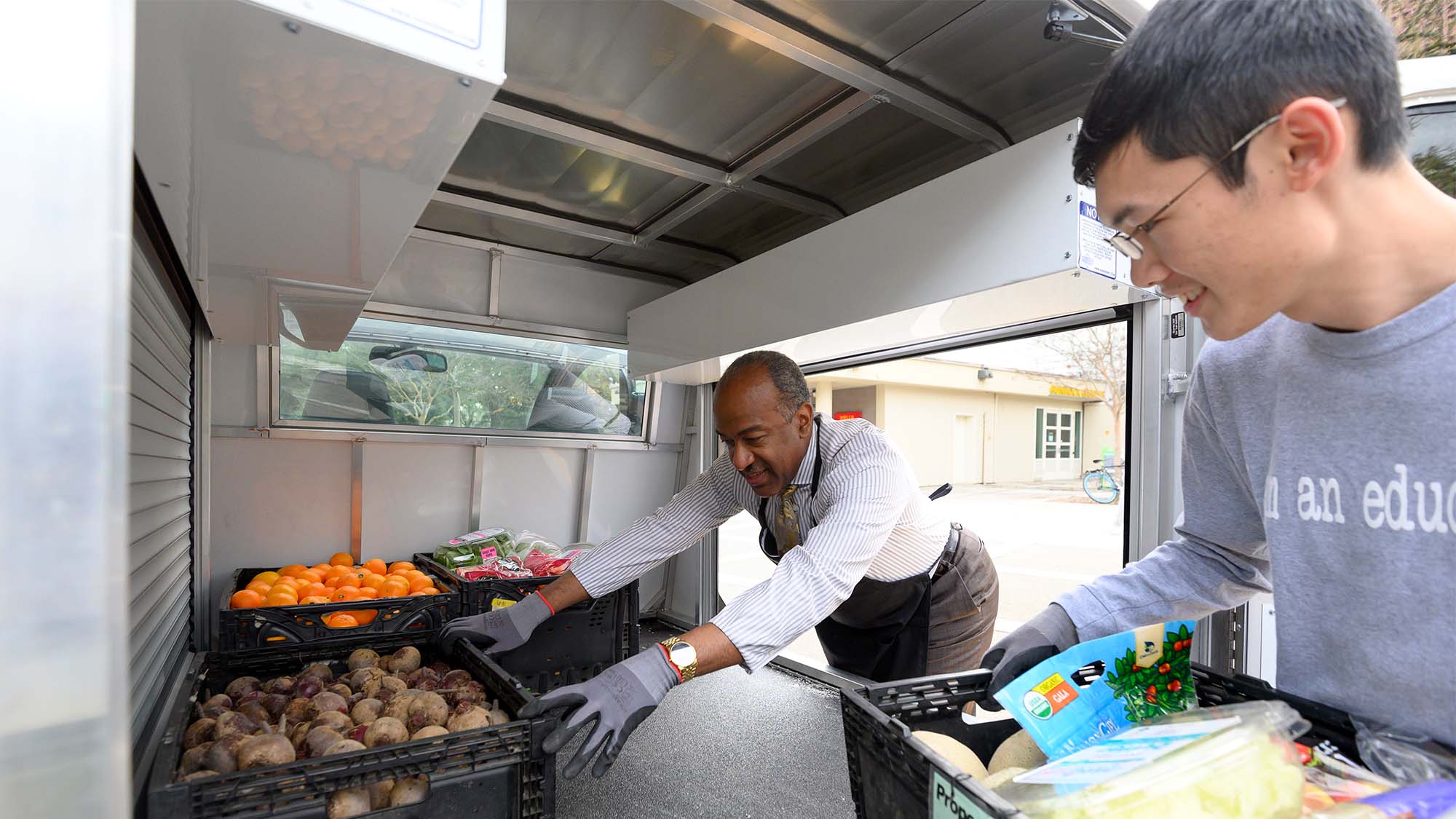
Basic needs have been a major focus of campus leaders like Chancellor Gary S. May and Pablo Reguerín, vice chancellor of Student Affairs.
In 2018, less than a year after coming to UC Davis, May formed task forces focused on basic needs in the areas of food security, affordable housing and mental health care. On food security, the task force recommended promoting existing campus services more and making the Pantry larger and more accessible.
The university did just that. The Pantry, previously located in the basement of the Memorial Union with food behind a counter, is now one of the first things visitors see in the building. It’s on the ground floor next to the welcome desk and a market selling snacks and beverages.
“It shows how ahead of the game Davis is in a lot of our support in food equity,” Radtke said.
Other programs available to UC Davis students include Fruit and Veggie Up!, which provides free produce; Aggie Compass also provides on-campus assistance with applying for CalFresh, the state program for low-income residents. Eat Well Yolo, a program of the Yolo Food Bank, distributes food on campus. Earlier this year, the university launched a pay-what-you-want food truck called AggieEats.
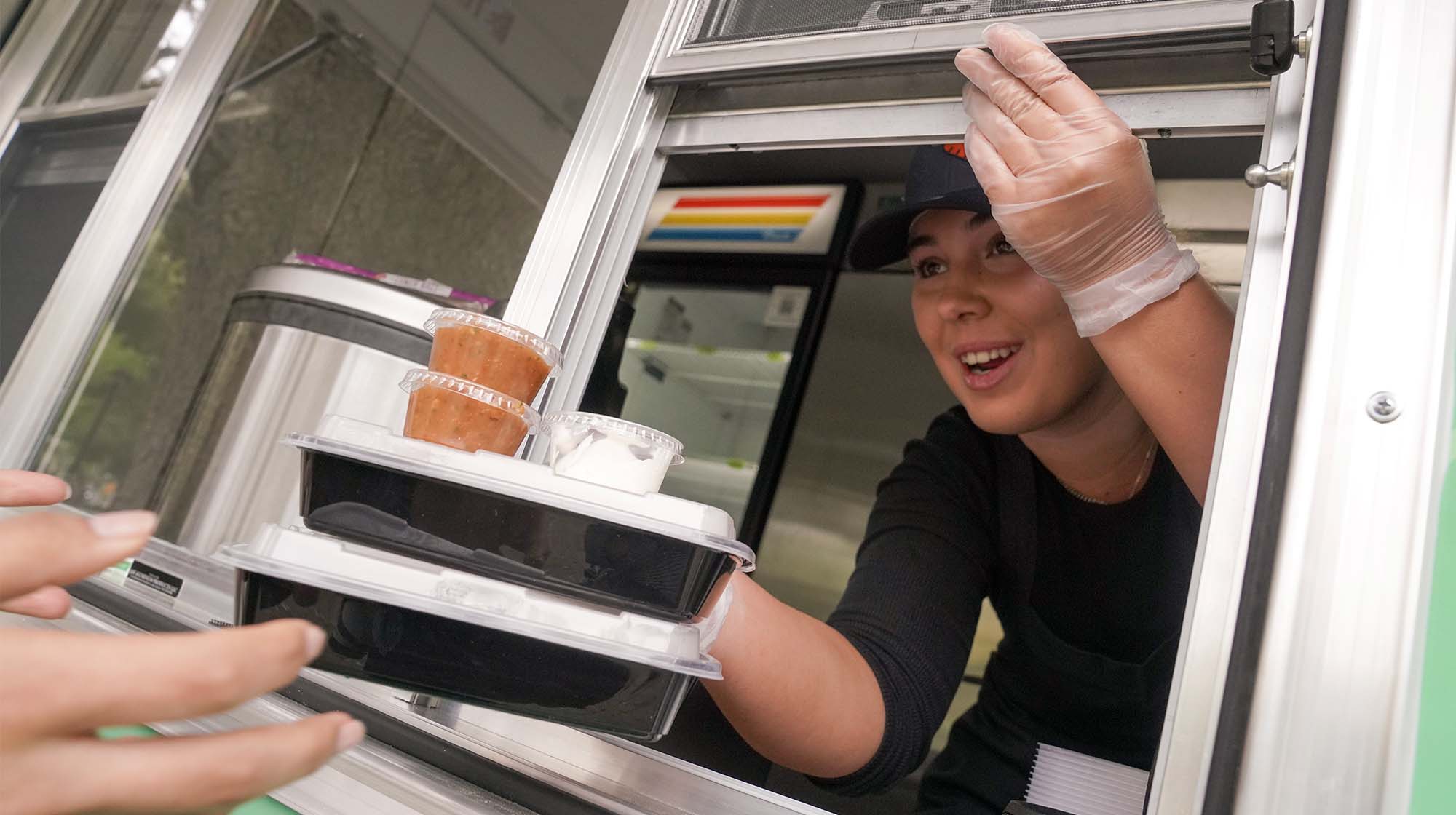
Food assistance and nutrition: Motivated by personal experiences
Chodur and Radtke both said they pursued careers in nutrition and food security because of things they had experienced as undergraduate students.
Chodur recalled her time as an undergraduate at Pennsylvania State University — a time when she was working an on-campus job and volunteering to gain experience in nutrition, plus bartending at night and receiving financial aid. All that work added up to more than 40 hours a week, but she still wasn’t making enough to have a steady supply of food, she said.
“There were months where I said, ‘Oh, I hope this club meeting has food, because that’s where I’m going to eat tonight,’” she said.
Radtke said she saw firsthand the impact food pantries can have when she worked as director of the Graduate Student Association Food Pantry at UC Davis: “I really saw the impact that such a small space was having on such a large population. Students accessing that really shared what that space meant to them.”
She said she can relate, having experienced the same thing as an undergrad.
“For me there were definitely times when groceries were running out, it was nearing the end of the month, and I was stretching food,” she said. “I was relying on friends and roommates to have food.”
Expanding understanding of public health through food insecurity research
A closer eye needs to be trained on food security to spur solutions and understanding, the researchers agreed.
“We’re still not seeing too many people evaluating the health outcomes,” Radtke said.
Chodur agreed: “There hasn’t been a lot of evaluation work in general, particularly in college students. A lot of that comes from a misunderstanding of what food insecurity and basic needs insecurity really is.”
She said more needs to be done to connect those who are going hungry with long-term programs like CalFresh.
“You aren’t going to food-pantry your way out of food insecurity,” Chodur said. “It’s emergency support. We’re saving them from missing meals, which is fantastic, and we want to do that, but we aren’t going to address the underlying fact that their money isn’t going far enough.”
That lack of knowledge persists in both college students and the broader population, she said.
Students may not use food assistance programs because they might assume they are supposed to go hungry as part of the college experience.
“There is a lack of recognition that what they’re experiencing isn’t normal,” Chodur said. “There is a romanticization of the college student who survives on ramen — that isn’t normal.”
In addition to the research already underway on campus, UC Davis researchers are looking outward.
Researchers are collaborating across the UC system, not just on research papers, but on ways to improve their food security programs and those elsewhere.
“We are light years ahead of what other systems and universities are doing, but we are helping them move forward, as well,” Martinez said. “Because of the model we’ve developed systemwide, other universities — they’re reaching out because they’re having the same challenges on their campuses.”
Martinez and Chodur, along with students and representatives from several UC campuses, traveled to Capitol Hill last month to advocate for the Enhance Access To SNAP Act of 2021, or the EATS Act, a proposal that would make it easier for college students to qualify for CalFresh and other similar programs around the country.
Marcella Gonsalves, a lecturer in the School of Medicine’s Department of Public Health Sciences, in 2020 used a grant from the Office of Public Scholarship and Engagement to help the Sacramento Food Bank and Family Services look at its own volunteer management and training.
And in April she received another grant from Public Scholarship and Engagement, this time to work with the Woodland-based nonprofit Center for Land-Based Learning to examine food access and nutrition. That project is in the early planning stages, she said.
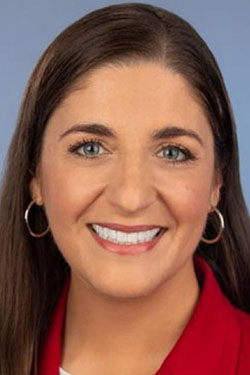
Gonsalves, who worked with public health-related nonprofits before joining the university, echoed the sentiment that community-based organizations often don’t have time or resources to do research of their own. She said UC Davis can make a big impact off campus by partnering with other organizations and communities.
“I am very interested in working with communities, whether it’s doing research or implementing programs to connect the dots and help communities get the resources they need,” Gonsalves said. “Maybe that’s our role in Davis — help people connect the dots more.”
Media Resources
Cody Kitaura is a News and Media Relations Specialist in the Office of Strategic Communications, and can be reached by email or at 530-752-1932.
